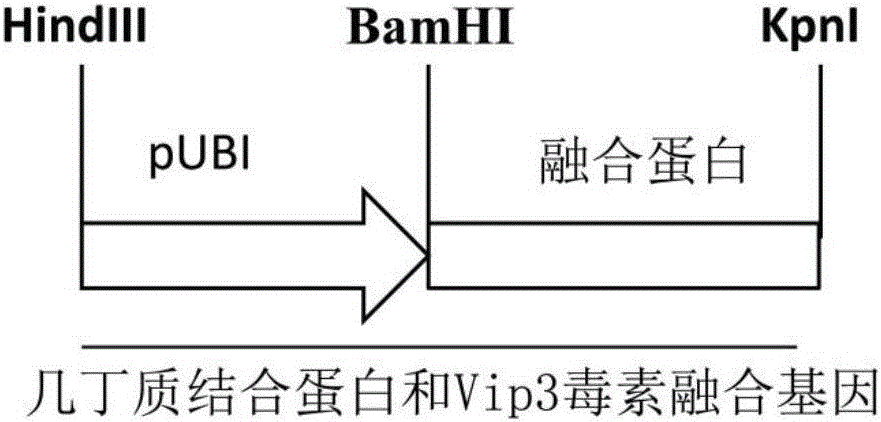Insect-resistant fusion gene and encoded protein as well as application thereof
A technology of fusion gene and fusion protein, applied in the direction of anti-enzyme immunoglobulin, anti-bacterial immunoglobulin, application, etc., to achieve the effect of delaying the generation of pest resistance, expanding the insecticidal spectrum, and widening the insecticidal spectrum
- Summary
- Abstract
- Description
- Claims
- Application Information
AI Technical Summary
Problems solved by technology
Method used
Image
Examples
Embodiment 1
[0028] Embodiment 1, the construction of Tma12-Vip3A fusion protein expression vector
[0029] The genes of Tma12 and Vip3A insecticidal proteins were synthesized by Shanghai Sangong, and their DNA sequences were SEQ ID NO: 5 and SEQ ID NO: 7 in Chinese patent 200610049611.0, and cloned in the restriction endonuclease BamHI of the pET28a expression vector and SacI site between. The constructed vectors were named pET28a-Tma12 and pET28a-Vip3A respectively.
[0030] The specific steps of Tma12-Vip3A synthesis are as follows:
[0031] 1. Using Vip3A (SEQ ID NO: 7 in Chinese patent 200610049611.0) as a template to obtain the Vip3A gene fragment by PCR.
[0032] 2. The primers are:
[0033] Vip3A-F: 5'CCCGGGAAGGGTGGAGGAATGAACAAGAACAACACCAAG and Vip3A-R: 5'CGAGCTCCTACTTGATGCTCACGTCGTAGAACTTCACGA. These two primers contain restriction endonuclease sites XmalI and ScaI sites, respectively.
[0034] 3. The PCR product was treated with XmaI and ScaI, and ligated with the pET28a-Tma...
Embodiment 2
[0036] Embodiment 2, construction of Tma12-Vip3H fusion protein expression vector
[0037] The genes of Tma12 and Vip3H insecticidal proteins were synthesized by Shanghai Sangong, and their DNA sequences were respectively SEQ ID NO: 5 and SEQ ID NO: 6, and were cloned between the restriction endonuclease BamHI and SacI sites of the pET28a expression vector between. The constructed vectors were named pET28a-Tma12 and pET28a-Vip3H respectively.
[0038] The specific steps of Tma12-Vip3H synthesis are as follows:
[0039]1. Using Vip3H (SEQ ID NO: 6) as a template to obtain a Vip3H gene fragment through PCR. The primers were: Vip3H-F: 5'CCCGGGAAGGGTGGAGGAATGAACAAGAACAACAGTAAG and Vip3H-R: 5'CGAGCTCCTACTTGATGCTGAAGTCCCTGAAGGTGATGT. These two primers contain restriction endonuclease sites XmalI and ScaI sites, respectively.
[0040] 2. The PCR product was treated with XmaI and ScaI, and ligated with the pET28a-Tma12 vector treated with the same enzymes.
[0041] 3. Transform i...
Embodiment 3
[0042] Embodiment 3, the expression of insecticidal protein
[0043] General standard method The above-mentioned expression vectors containing the fusion protein gene (pET28a-Tma12-Vip3A, pET28a-Tma12-Vip3H, pET28a-Tma12, pET28a-Vip3A and pET28a-Vip3H) were respectively transformed into Escherichia coli BL21star. Pick a monoclonal colony and inoculate it into 100ml LB bacterial culture medium, shake and cultivate to OD at 37°C 600 =0.6, add IPTG to 0.5mM, and continue to incubate under the same conditions for 4 hours. The collected culture solution was centrifuged at 5000 g for 10 minutes to precipitate E. coli cells, and then the supernatant was discarded to collect the precipitate. Add 30 ml of 20mM Tris-HCL buffer solution to the precipitate and ultrasonically pulverize it for the determination of insecticidal activity.
PUM
 Login to View More
Login to View More Abstract
Description
Claims
Application Information
 Login to View More
Login to View More - R&D
- Intellectual Property
- Life Sciences
- Materials
- Tech Scout
- Unparalleled Data Quality
- Higher Quality Content
- 60% Fewer Hallucinations
Browse by: Latest US Patents, China's latest patents, Technical Efficacy Thesaurus, Application Domain, Technology Topic, Popular Technical Reports.
© 2025 PatSnap. All rights reserved.Legal|Privacy policy|Modern Slavery Act Transparency Statement|Sitemap|About US| Contact US: help@patsnap.com



